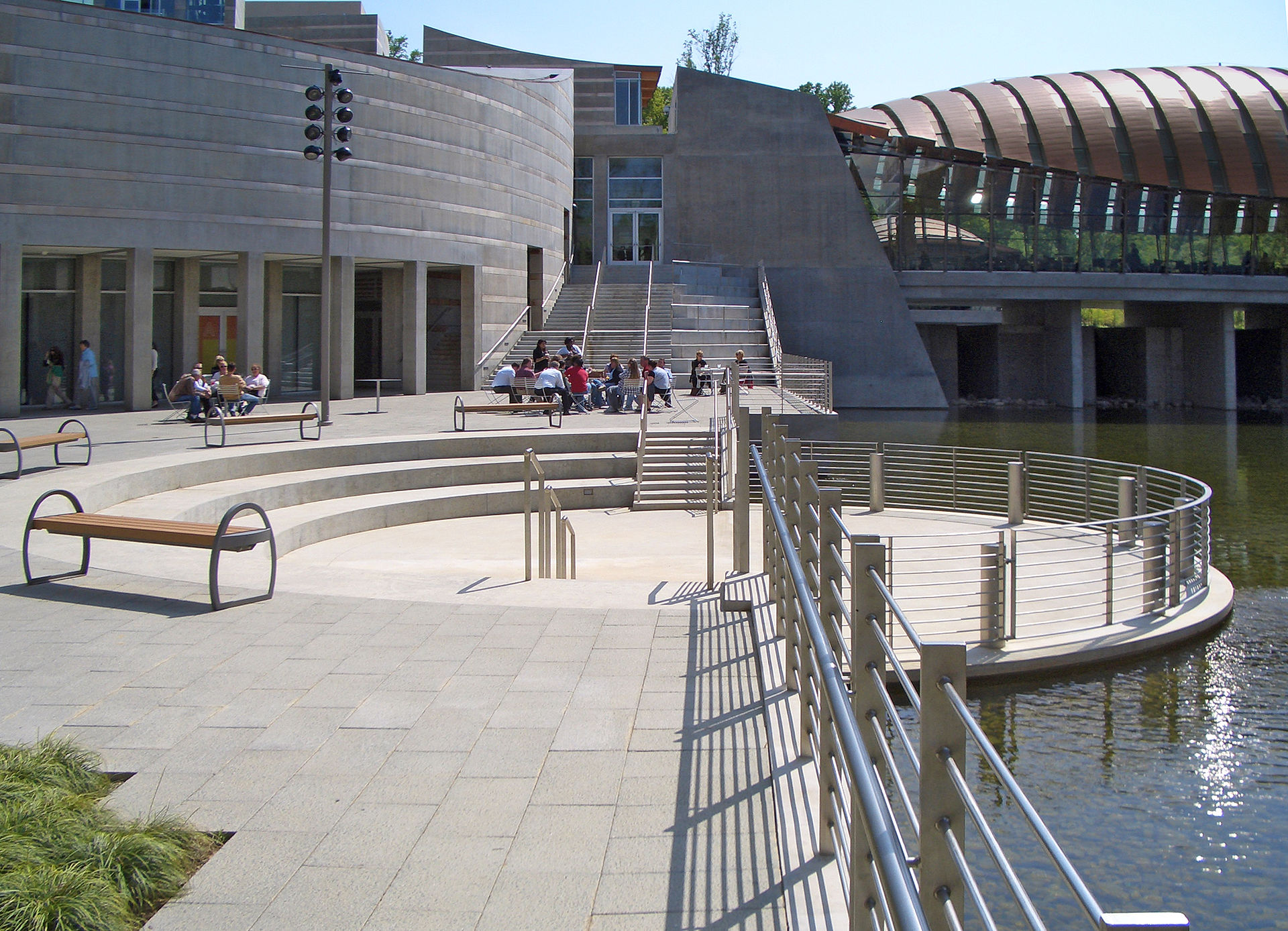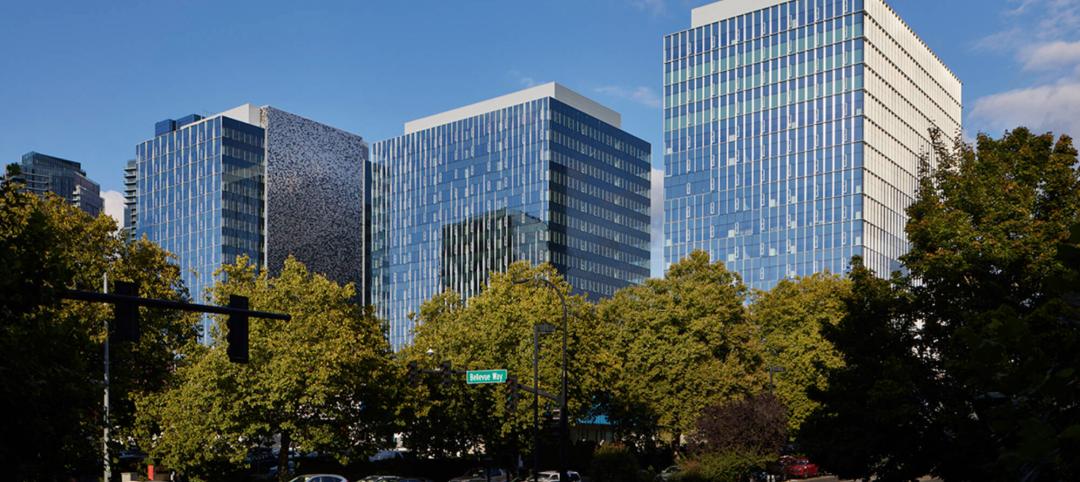The Board of Directors of the American Institute of Architects (AIA) voted to award the 2015 AIA Gold Medal to Moshe Safdie, FAIA, whose comprehensive and humane approach to designing public and cultural spaces across the world has touched millions of people and influenced generations of younger architects.
The AIA Gold Medal, voted on annually, is considered to be the profession’s highest honor that an individual can receive. The Gold Medal honors an individual whose significant body of work has had a lasting influence on the theory and practice of architecture. Safdie will be honored at the 2015 AIA National Convention in Atlanta.
Born in Haifa, Israel in 1938, Safdie moved with his family to Montreal in 1953. He studied architecture at McGill University, and after graduation worked with AIA Gold Medalist Louis Kahn, FAIA, in Philadelphia. He returned to Montreal to work on Habitat ’67, for Montreal’s 1967 World’s Fair, which consisted of a series of 158 stacked and terraced apartments.
Safdie then began a series of teaching posts that culminated with his appointment as the director of the urban design program at the Harvard Graduate School of Design from 1978-84. Since 1978, Safdie has been based in Boston while remaining a citizen of Israel, Canada, and the United States. Safdie established a Jerusalem office in 1970 and another in Shanghai in 2011.
Many of Safdie’s Asian and Middle Eastern projects exhibit a sense of timelessness closely associated with his mentor, Kahn. Safdie once told Tablet Magazine that if architecture is good, “then it will feel obvious, and like it’s always been there.” In Israel, his Mamilla Center blends in contextually and materially with a 19th century Jerusalem neighborhood, offering people range of dynamic gathering spaces and enhancing the contemporary urban experience.
In Punjab, India, his design for the Khalsa Heritage Centre (a museum of Sikh history and culture) shows visitors an elemental juxtaposition of stone and concrete with water. The building is made up of a rich mix of orthogonal geometry and curvilinear forms, organic and flowing in some places and rigid and rational in others. This mixture alludes to the primeval determination the earliest builders felt when they conspired to put together posts, lintels and right angles in defiant opposition to gravity, and also the natural world they struggled to endure against.
This is a pattern seen throughout Safdie’s architecture: the broad, explicit combination of grid-based forms with fluid curves. Safdie’s work naturally melds opposing forms— fusing arcs into squares, spheres into cubes, and ovals into rectangles—to create emotionally evocative architecture.
In her nomination letter, Boston Society of Architects president Emily Grandstaff-Rice, AIA, wrote: “Moshe Safdie has continued to practice architecture in the purest and most complete sense of the word, without regard for fashion, with a hunger to follow ideals and ideas across the globe in his teaching, writing, practice and research.”
Some of Safdie’s most notable works include:
The Salt Lake City Main Public Library, a triangular glass library intersected by a crescent-shaped wall which forms an urban room and leads visitors up to an observation deck with views of the nearby Wasatch Mountains. The transparency offered by the glass library volume and the gracefully arcing wall and public space it forms evokes a dramatic contrast of enclosure and openness.
The Yad Vashem Holocaust History Museum in Jerusalem, a concrete prism carved into Mt. Herzl that takes visitors on a linear, narrative journey that explores the individual identities of Holocaust victims, finally giving way to an observation deck with broad views of Jerusalem below, symbolizing the collective future of the Jewish people.
Marina Bay Sands in Singapore is a high-density urban district that serves as a gateway to Singapore, anchors the Singapore waterfront, and provides a dynamic setting for a vibrant public life. The project’s most dramatic feature is the 3-acre SkyPark, which connects the hotel’s three 55-storey towers at the top, spanning from tower to tower and cantilevering 213 feet beyond. Its mixed-use program (theater, museum, hotel, convention center) makes it nearly a city unto itself.
The Crystal Bridges Museum of American Art in Bentonville Ark., an idyllic village of copper-clad shells containing American art. This village of forms creates a series of dams and bridges over a reservoir fed by nearby Crystal Springs, intimately revealing the natural landscape and huddling around the water like a group of timeworn river stones.
Safdie is the 71st AIA Gold Medalist. He joins the ranks of such visionaries as Thomas Jefferson (1993), Frank Lloyd Wright (1949), Louis Sullivan (1944), Le Corbusier (1961), Louis I. Kahn (1971), I.M. Pei (1979), Thom Mayne (2013), and Julia Morgan (2014). In recognition of his legacy to architecture, his name will be chiseled into the granite Wall of Honor in the lobby of the AIA headquarters in Washington, D.C.
Related Stories
AEC Tech Innovation | Oct 8, 2024
New ABC technology report examines how AI can enhance efficiency, innovation
The latest annual technology report from Associated Builders and Contractors delves into how artificial intelligence can enhance efficiency and innovation in the construction sector. The report includes a resource guide, a case study, insight papers, and an essay concerning applied uses for AI planning, development, and execution.
Healthcare Facilities | Oct 8, 2024
Herzog & de Meuron completes Switzerland’s largest children’s hospital
The new University Children’s Hospital Zurich features 114 rooftop patient rooms designed like wooden cottages with their own roofs. The project also includes a research and teaching facility.
Mixed-Use | Oct 7, 2024
New mixed-use tower by Studio Gang completes first phase of San Francisco waterfront redevelopment
Construction was recently completed on Verde, a new mixed-use tower along the San Francisco waterfront, marking the end of the first phase of the Mission Rock development. Verde is the fourth and final building of phase one of the 28-acre project that will be constructed in several phases guided by design principles developed by a design cohort led by Studio Gang.
Brick and Masonry | Oct 7, 2024
A journey through masonry reclad litigation
This blog post by Walter P Moore's Mallory Buckley, RRO, PE, BECxP + CxA+BE, and Bob Hancock, MBA, JD, of Munsch Hardt Kopf & Harr PC, explains the importance of documentation, correspondence between parties, and supporting the claims for a Plaintiff-party, while facilitating continuous use of the facility, on construction litigation projects.
Glass and Glazing | Oct 7, 2024
Pattern language: An exploration of digital printing on architectural glazing
Architectural Glazing has long been an important expressive tool which, when selected and detailed thoughtfully, can contribute to the successful transformation of architectural concepts to reality.
University Buildings | Oct 4, 2024
Renovations are raising higher education campuses to modern standards
AEC higher ed Giants report working on a variety of building types, from performing arts centers and libraries to business schools. Hybrid learning is seemingly here to stay. And where possible, these projects address wellness and mental health concerns.
AEC Tech | Oct 3, 2024
4 ways AI impacts building design beyond dramatic imagery
Kristen Forward, Design Technology Futures Leader, NBBJ, shows four ways the firm is using AI to generate value for its clients.
Laboratories | Oct 2, 2024
Trends in scientific research environments: Q&A with Flad's Matt McCord
As part of an ongoing series, Matt McCord, AIA, NCARB, LEED AP BD+C, Associate Principal with Flad Architects, discusses the future of the scientific workplace.
Museums | Oct 1, 2024
UT Dallas opens Morphosis-designed Crow Museum of Asian Art
In Richardson, Tex., the University of Texas at Dallas has opened a second location for the Crow Museum of Asian Art—the first of multiple buildings that will be part of a 12-acre cultural district. When completed, the arts and performance complex, called the Edith and Peter O’Donnell Jr. Athenaeum, will include two museums, a performance hall and music building, a grand plaza, and a dedicated parking structure on the Richardson campus.
Data Centers | Oct 1, 2024
10 biggest impacts to the data center market in 2024–2025
While AI sends the data center market into the stratosphere, the sector’s accelerated growth remains impacted by speed-to-market demands, supply chain issues, and design innovation necessities.

















